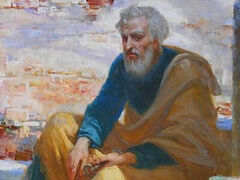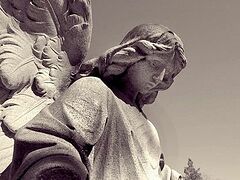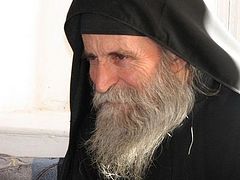Monk Nikon is abbot (geronda) of St. Spyridon’s Cell attached to the New Skete on Holy Mount Athos and a disciple of Elder Ephraim of Arizona.
Let me cite another example. One spiritual father had a book published. It relates how a priest got engaged in very active social work in a big provincial city and eventually became proud of the fruits of his labor. Filled with arrogance, he would say:
“Who is Fr. Amphilochios (Makris)? Does he do more than I do? Who is Fr. Philotheos (Zervakos)? Does he do more than I do?”
One night, when the priest was asleep, he suddenly woke up without any reason. Something awakened him. The presbyter rose, got dressed without understanding what he was doing, put on his kamilavka cylindrical cap and looked at the clock. It was half past two at night. He went outside and, without understanding why he was doing it, entered the church through the emergency door. The weather was cloudy, lightning flashed, and it was going to rain. Staggered, the priest was gazing at the church. Suddenly there was a flash of lightning and everything around was lit up. In those several moments he managed to see a layman make the sign of the cross in the narthex, open the church door and go inside. The priest hurried after him, quietly opening the church door so that he could not be heard. The icon lamps were burning, and the presbyter saw the layman praying on his knees in front of the iconostasis and an icon of Jesus Christ. And suddenly light began to come from the icon of the Savior. Afterwards the priest described the light that rose above the floor and illuminated not only the layman who was praying on his knees but the entire church. The priest was glued to the spot by the church door. After a long time the light began to dim. The layman got up from his knees and said:
“Through the prayers of our Holy Fathers O Lord Jesus Christ, Son of God, have mercy upon us, amen!”
And after the word “Amen” there was a strong rumble of thunder. The whole sky was lit up. The priest quickly went outside; after a time the layman also came out, closing the door of the church. The priest followed him until the layman entered his house. He memorized the address of the house and went back home. It was half past five in the morning. A few people were walking along the road. The priest got back home but couldn’t fall asleep. He would toss from side to side restlessly in bed. “What happened? Who is that man?” he would ask himself.
The next day the priest came to the house of that remarkable layman and started to walk around it. Every day he would come to that house over and over, trying to find someone to inquire about the owner of the house. And he finally found such a person.
“Please, tell me who lives here.”
“Why are you asking, father?”
“Do tell me who lives in this house, please!”
The person told him. The priest hadn’t known that man before.
“Is he a good person?”
“Yes, he is.”
“Is he a churchgoer?”
“Of course he is, as are his wife and children.”
“Ah, does he have a wife and children?”
“Yes, he does.”
“How many children has he got?”
“I think, eight children.”
After coming to the house many times the priest managed to meet its owner. He was an ordinary man, but with a bright face, pure eyes and a gentle smile; a humble, meek and kind man. He took care of the priest, hospitably receiving him in his home and asking him about certain things. The layman would regularly go to confess his sins to a famous spiritual father in the regional city. His entire family would often receive Communion and they led a simple and peaceful life with fasting, vigils, prayer and abstinence. That man was the father of a large family and a bank clerk. He supported his wife, their eight children, his elderly father and brother.
Something was needling the priest from inside: “What is the inner life of this layman? What life does he live if his nocturnal prayer yields such great grace?” It was something he never found out. The priest kept indoors, didn’t speak to anyone and was pensive for a whole week. For a whole month the priest suffered from anxiety. Thus he learned this spiritual lesson.
Good and great deeds have no value in the eyes of God without humility. An ordinary but humble person, the head of a family, had incomparably greater boldness towards God than the priest who was considered to be more pious, more active and holier than his parishioners.
“Truly, what a tragic irony!” my father-confessor told me.
He learned the lesson very well. God resisteth the proud, but giveth grace unto the humble (Js. 4:6). He learned that blessed are the poor in spirit, the humble and the pure in heart because they will see God and theirs will be the Kingdom of Heaven.
“Thirty years ago I had given Communion to that priest at the Metaxa Cancer Hospital shortly before he died of a brain tumor,” the spiritual father who was the author of that book recounted.
Kosta’s new skin
A woman wrote a letter to the abbess of St. Raphael’s Convent:
“Dear Mother! My little son Kosta who studies at a gymnasium got burns from a steam boiler explosion together with two other children. There is no place on him that is not burned—his body is covered with burns from head to foot. He was immediately rushed to hospital. The doctors said he will die, and even if he survives he will remain paralyzed. Once I heard that, I said the words that came from the depths of my being:
‘St. Raphael [most probably the New Martyr Raphael of Lesbos, who suffered with Sts. Nicholas and Irene in the fifteenth century at the hands of Turks.—Trans.], have mercy on my child and save him so that he doesn’t die and nothing bad happens to him! Otherwise let the Lord take him already this night so none of us should suffer torments!’
“At night, while half-asleep, I dreamed that I was in Mytilene and saw St. Raphael in white robes, who came up to me and said:
‘Magdalena, Kosta will recover! He will be back at home. Not a single scar will remain on his body soon!’
“The same night my son saw St. Raphael remove his black skin and heard him say:
‘You will recover fully.’
“From that moment on his condition improved swiftly. Fifteen days later he returned home and all the scars on his body disappeared.
“The doctor told me that it was a great miracle.”
At the end of the letter the first and the last name, the date, and the country were indicated—it was Australia.
While listening to me, you may feel doubts about this account; but can the mother say that a miracle didn’t occur? Can her son, who experienced all this, say that there was no miracle?
You can argue:
“Yes, he is telling us good fairy tales!”
I heard that a doctor and his wife have children. I too may doubt and say:
“How can I be sure that this really happened?”
But now these parents watch their twins grow up. Can they say, “Our children were not born”? Can they doubt the birth of their own children?
A demoniac at Elder Paisios’
I met a possessed man. He described a scene to me. On the way from the Iveron Monastery to Karyes there was a path on the left that led to the cell of St. Paisios. The demoniac believed that he had “a sixth sense”.
“I see Elder Paisios outside his cell. He is sitting on a stone slab under an olive tree and doing his needlework,” he would say to himself while at a great distance from the elder’s cell.
He took that path and reached Elder Paisios’ cell. And indeed, everything was according to his description… Except one thing: there was no Elder Paisios there. The demoniac was surprised. He asked himself:
“What has happened?”
He didn’t know that the devil can’t foresee the future. And satan couldn’t have imagined what Elder Paisios had prepared for him. The demoniac saw Elder Paisios leave his cell and the saint shouted to him:
“You’re deluded! I went inside my cell so you couldn’t see me outside the cell and could make out that the one who had shown it to you was the devil!”
I asked him:
“Do you understand that the devil can’t foresee the future and he couldn’t have known that Elder Paisios would enter his cell?”
He replied:
“But I did see Elder Paisios—and he wasn’t in the cell!”
There was no way of making him change his mind.
I was stunned by the fact that Elder Paisios—located hundreds of yards away—knew what was on the mind of the demoniac who was on the way to Karyes.
But some people mocked Elder Paisios, ridiculed him and would say ironically: “He is a ‘visionary’ who dug himself a grave on Mt. Athos, believing that he would be buried there, whereas he was buried at Thessaloniki.” These people fail to understand that he dug himself a grave to remind himself and us monastics of our inevitable death. Who said that he allegedly believed that he would find his resting place there? How many people did similar things! One monk kept a skull in his cell to remind himself of death and that he is mortal.
What blinds us and why don’t we see the holiness of the saints?
You can’t imagine what torments St. Nectarios of Aegina went through in his lifetime, as is the case with all saints. The living saint who lives abroad [most probably Elder Ephraim of Arizona with whom Fr. Nikon was united by close spiritual ties.—Auth.] goes through the same and even greater torments. What obstructs us and why don’t we see this? Our lives are just different from theirs—they strive to keep the commandments of Christ! A Christian struggles with his passions and he will be saved through this. Whether or not he will be able to get over the passion depends not on him but on the grace of God—if the Lord sends him grace, then he will conquer the passion; if He doesn’t send it, the Christian will continue to combat it. He will be crowned by the struggle he carries on, so let us not forget that in this warfare we fall and rise again and will wage this war till we die. A passionate person who has been enslaved by the passions will hate a struggling monk, because by his struggle the latter shows him what he is expected to do but doesn’t want to do because he is slave of the passions.
So, if you begin to talk about Christ with an immoral person, he will say:
“Who is Christ? We prefer everything Greek: we have our own gods, there are twelve of them on Mount Olympus. None of them is foreign!”
Will he ever say, “I don’t accept the teaching of Christ because I want to lead a dissolute life”?
He can’t say such things and he pretends to be a Greek patriot. This applies to a fraud and a thief as well. They will never say to you:
“I don’t want to accept the teaching of Christ and the Church because it forbids me to steal and swindle.”
Rather, they will deride and hate the saints. And this attitude and state of mind had existed even before the birth of Christ.
It is written in the Old Testament, “Let us tie up the righteous man, condemn him to a horrible death, and murder him horribly.” Why? Because it is hard for us to look at him. We can’t even look at him!
Because his path is different from ours. That is why sinners want to kill saints. Ugly people don’t like looking at themselves in the mirror or being photographed. All the more, spiritually ugly people hate looking at saints. If they can, they will murder them physically; and if they can’t, they will destroy them morally and spiritually. They try to run them down and caricature them. As a Greek poetess said: “We always make a laughingstock of those who we envy, and Mt. Athos is my witness.” Because we don’t want to imitate the saints and change our lives, and it is because of this that all this envy begins.
Only those who share in holiness recognize the saints. And nobody else does. And you need to have a little holiness to recognize a saint.





